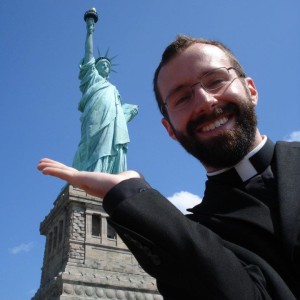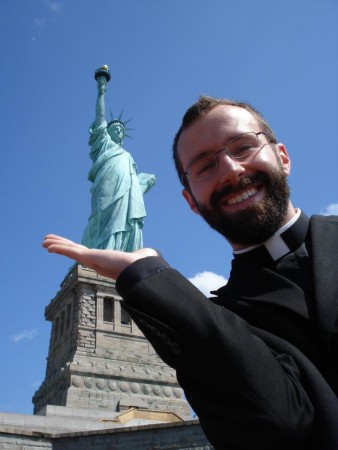Archbishop Naumann is preparing to ordain four of my brother seminarians to the priesthood at 10:30 a.m. on May 25 at St. Matthew Parish in Topeka. One of them, Deacon Nathan Haverland, was highlighted recently in The Leaven (and The Deacon’s Bench) for his unique life story: growing up without religion, he discovered God while studying astrophysics, and entered seminary after getting his master’s in nuclear engineering. From the Leaven article:
Deacon (almost Fr.) Nathan Haverland “I never thought about being a priest while I was growing up,” he said. “I didn’t know what a priest was.”
Both his mother and stepfather had been raised Catholic, but fell away from the faith early, so Deacon Haverland and his older sister didn’t have any religious upbringing. Sunday was just another day of the weekend.
Ah, but God cannot be denied.
French philosopher Blaise Pascal wrote: “There is a God-shaped vacuum in the heart of every person, and it can never be filled by any created thing. It can only be filled by God, made known through Jesus Christ.”
Deacon Haverland was not immune to the pull of that vacuum.
“Everybody has that natural desire to know God, so I think I had that as well,” he said. “I remember asking and thinking questions about stuff like that, but I never had a means to learn.”
His path took a fateful turn when he decided to enroll in a small Catholic college in Atchison — Benedictine.
“They had a nice little physics and astronomy department, which is what I wanted to study,” said Deacon Haverland. “There are only two places in Kansas where you can study physics and astronomy. One was the University of Kansas, and the other was Benedictine.”[…]Thanks to great teachers, he said, he began to learn about the Scriptures and Christ. It all made sense. Gradually, his knowledge began to change him. He underwent a slow conversion of mind and heart.
“It was more of a gradual process, more than anything,” he said. “It wasn’t until after my sophomore year that I was having a conversation with someone, and I had to admit I wasn’t Catholic, and I was just kind of sad about it. That was the beginning of me starting to join the church.”[…]“I never imagined [growing up] that I’d become a priest. It baffles me as well,” he said. “It is an unusual path to take. I’ve just kind of enjoyed the ride.
Read the whole thing. It’s a great story, and a great reminder of the importance of good Catholic formation. The article mentions his devotion to St. Thérèse of Lisieux, but I wanted to add a story to that: on October 1 of last year, the feast day of St. Thérèse, he defended his thesis on St. Thérèse and the priesthood, while carrying a first-class relic of St. Thérèse in his pocket. That’s devotion.
By the way, Dcn. Haverland has posted here before, although he appears to have decided that preparing for the priesthood is more important than blogging. Congrats to Deacon Haverland, along with the other three men set to be ordained: Deacon Daniel Schmitz, Deacon Quentin Schmitz, and Deacon Larry Bowers. Please join me in offering up some prayers for them as they are configured to Christ in a radical way.


How does the Church cope with seminarians that have large student loans?
Daniel,
That’s up to the ordinary (the bishop or religious superior). Most dioceses have policies of how much that they’ll reimburse, as well as when and how they will do so. There are a number of considerations that go into it, from what I can tell. We don’t want guys entering seminary who are running from loan debt, but we also don’t want to see an authentic vocation quashed by student loans.
So it’s not uncommon for part (or even all) of a man’s student loan burden to be paid off by his diocese (sometimes this happens upon ordination, but it can happen at other times). Additionally, private groups and individual donors will often step up to help pay off the debt. Finally, there are ways of achieving loan forgiveness through the federal government, if you know what you’re doing: for example, “income based repayment,” in which you pay at a much lower rate (calculated based upon your income level), with loan forgiveness after 25 years.
So a man shouldn’t presume himself disqualified simply because of student loan debt, but he should be upfront about it.
I.X.,
Joe
How do seminarians earn money to pay cellphone bills etc? Are you paid when made a deacon or student work programs or deliver pizza or what?
That’s fascinating. Hopefully someday we can get him to return to the blog to unpack his “slow conversion of mind….” There’s not much better than the intellectual history of a thoughtful person’s conversion.
That’s fascinating. Hopefully someday we can get him to return to the blog to unpack his “slow conversion of mind….” There’s not much better than the intellectual history of a thoughtful person’s conversion.